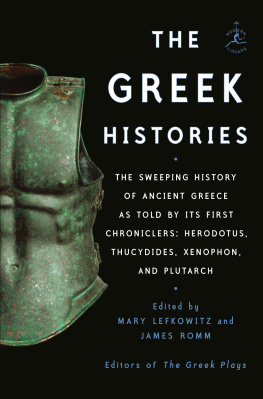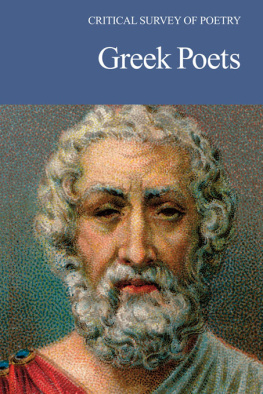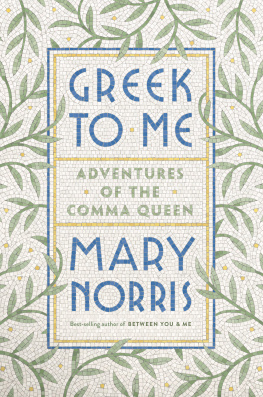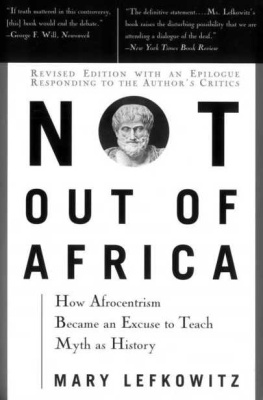Mary R. Lefkowitz - The Lives of the Greek Poets
Here you can read online Mary R. Lefkowitz - The Lives of the Greek Poets full text of the book (entire story) in english for free. Download pdf and epub, get meaning, cover and reviews about this ebook. year: 2012, publisher: Bloomsbury, genre: History. Description of the work, (preface) as well as reviews are available. Best literature library LitArk.com created for fans of good reading and offers a wide selection of genres:
Romance novel
Science fiction
Adventure
Detective
Science
History
Home and family
Prose
Art
Politics
Computer
Non-fiction
Religion
Business
Children
Humor
Choose a favorite category and find really read worthwhile books. Enjoy immersion in the world of imagination, feel the emotions of the characters or learn something new for yourself, make an fascinating discovery.

- Book:The Lives of the Greek Poets
- Author:
- Publisher:Bloomsbury
- Genre:
- Year:2012
- Rating:4 / 5
- Favourites:Add to favourites
- Your mark:
- 80
- 1
- 2
- 3
- 4
- 5
The Lives of the Greek Poets: summary, description and annotation
We offer to read an annotation, description, summary or preface (depends on what the author of the book "The Lives of the Greek Poets" wrote himself). If you haven't found the necessary information about the book — write in the comments, we will try to find it.
The Lives of the Greek Poets — read online for free the complete book (whole text) full work
Below is the text of the book, divided by pages. System saving the place of the last page read, allows you to conveniently read the book "The Lives of the Greek Poets" online for free, without having to search again every time where you left off. Put a bookmark, and you can go to the page where you finished reading at any time.
Font size:
Interval:
Bookmark:

For Hugh Lloyd-Jones
In Memoriam
This is a short book about a topic that has been considered to be peripheral to mainstream classical studies, the ancient biographies of the Greek poets. In the first edition of this book (1981), I argued that these biographies preserved only a relatively small amount of historical information and that therefore students of the ancient world should not try to use the biographies as a guide to the interpretation of ancient poetry, even though that had been the standard practice up to that time. I suggested that much of the material in all of the lives was a kind of fiction and that if any factual information survived it was usually because the poet himself provided it for a different purpose than that intended by his or her biographers. I argued that even plausible-sounding material should be regarded with suspicion. In particular I wanted to interrogate certain commonly held assumptions, for example, that Sophocles was more pious than Euripides, whose dramas appeared to his biographers to question the existence of the gods, and that the poet Callimachus specifically disapproved of the work of his younger contemporary Apollonius of Rhodes. Instead, I sought to show (and still believe) that literary analysis of these works ought to be based not on the poets biographies but on the poems themselves. Since the appearance of the first edition of this book, even scholars who do not agree with everything that I have said have nonetheless tended not to use the ancient biographies as a guide to understanding ancient poetry.
I wrote the original version of this book because, in the course of my work on the fifth-century B.C. poet Pindar (collected in Lefkowitz 1991), I had discovered that much of what the ancient commentators said about the historical setting and performance of his poetry did not derive from independent sources but rather had been deduced by inference from the text of his poems. When the I in Pindars odes insists on his superiority to others, the commentators did not observe that archaic poets regularly made such claims, to establish their authority. Rather, these commentators supposed that hostile environments had elicited the poets assertions and complaints. These views, although founded on conjecture, made Pindars text unnecessarily difficult to understand. I also found little in the way of historical information about the poet in the Vitae that accompanied the manuscripts of his poetry. Sections of these biographies appeared to be based on his hymns, with anecdotes about his connection to the gods. Was it possible that we had no independent biographical information in the case of other poets as well? Janet Fairweather, in a pioneering article (1974), had called attention to the unreliability of many so-called facts in the biographical tradition. But no one had yet tried to look at the subgenre of biographies of poets. My hypothesis was that the lives of poets might be different from those of philosophers or historians, because of the nature of their writings. I began by looking at the manuscript Vita of Euripides (Lefkowitz 1979) and then considered the literary tradition about the quarrel between Callimachus and Apollonius (Lefkowitz 1980).
This second edition of Lives of the Greek Poets offers a wider perspective on literary biography than the original version did, and it aims to provide a more sympathetic portrait of the writers who tried to create biographies for the poets whose works they admired and sought to interpret for posterity. Here I have followed the lead of Barbara Graziosi (2002) and taken such advantage as I could of other recent studies in ancient reception. Whenever possible I have tried to say something about the work of individual biographers and to give some indication of how biographical traditions developed over time. As in the first edition I have concentrated on the anecdotes and narrative structure of the biographies and have not attempted to investigate how ancient biographers determined the poets dates or constructed catalogues of their works or discoveries.
Also in this second edition I have updated citations of ancient sources to take account of the many invaluable works of reference that have been published in the past thirty years and have included references to scholarly literature published during that time, though I regret that I was unable to consult Hanink 2010 and Knbl 2010 in time to meet this books production schedule. Not least, I have corrected mistakes and inadvertent omissions, taking advantage of criticism and suggestions by the reviewers of the first edition, especially Bell 1983, Fairweather 1982 and 1983, and Griffin 1982. I have tried both to learn from and to respond to criticism by Cameron 1995, Graziosi 2002, Scullion 2003, Irwin 2006, and Kivilo 2010. I have also attempted to make this version of the book more user-friendly, keeping in mind that much of the material that I discuss is unfamiliar even to professional classicists.
Although I hope that this book will continue to be useful for professional scholars, I have tried to keep it accessible to readers who do not know ancient Greek. I have translated and transliterated all Greek words and phrases. Also for the convenience of readers I have provided my own translations of some of the longer and more influential biographies, in the appendixes. Following the practice of the Oxford Classical Dictionary, I have used throughout the Latinized versions of Greek names, on the grounds that they will be more familiar to most readers.
While I was working on the first edition of this book I received consistent encouragement from Arnaldo Momigliano and Sir Ronald Syme. Colin Macleod urged me to write the first edition of this book and made suggestions and improvements throughout. I had the generous support of Wellesley College, the National Endowment for the Humanities, and St. Hildas College, Oxford.
In preparing the second edition I owe thanks to Richard Fletcher and Johanna Hanink for inviting me to participate in the Laurence Seminar at the University of Cambridge in 2010, to Ranja Knbl for her helpful suggestions, and to Timothy Duff for his advice about my work on the life of Euripides. Once again I am grateful to Wellesley College for supporting my research and to Daphne Franois for her dedicated assistance with it. The illustration on the dust jacket depicting Menander, Glycera, and the goddess Comedy (Princeton 40.435) was reproduced with the kind permission of the Princeton Art Museum.
I cannot adequately acknowledge here my debt to my husband, Sir Hugh Lloyd-Jones, for his continued interest in this project, suggestions, and criticism. This book is dedicated to his memory.
What do we know about the actual lives of the ancient Greek poets, whose works we still read and whose ideas have had a lasting influence on all Western literature? Not much, compared with what we know about most modern writers. The biographers of Greek poets did not have at their disposal the kinds of historical materials that modern biographers can now resort to: diaries, letters, newspapers, historical records, registers of births and deaths. They had no firsthand information about what the poets read and studied, who taught them to compose verse, exactly who their family members were and what they were like, or where the poets traveled, when and where they were born and died or what caused their deaths, or when and by what means the poets works were published.
Records were not kept, for technological reasons. Permanent storage materials, such as papyrus, were expensive and thus available only to the wealthy. It was by no means easy to write about topics that required research. Literary and historical works were handwritten on book rolls that were difficult both to read and to manipulate, even using both hands. It was never easy, and sometimes impossible, to check a reference. The poets contemporaries did not record detailed biographical information, in part because they already knew it and in part because they thought that such factual details were worth recording only if they played some role in a life and death enterprise, such as a trial or a war. Historians like Herodotus or Thucydides provided brief biographies of kings and generals. Alexander could command the services of a Callisthenes, but no ancient poet seems to have had a Boswell.
Next pageFont size:
Interval:
Bookmark:
Similar books «The Lives of the Greek Poets»
Look at similar books to The Lives of the Greek Poets. We have selected literature similar in name and meaning in the hope of providing readers with more options to find new, interesting, not yet read works.
Discussion, reviews of the book The Lives of the Greek Poets and just readers' own opinions. Leave your comments, write what you think about the work, its meaning or the main characters. Specify what exactly you liked and what you didn't like, and why you think so.









